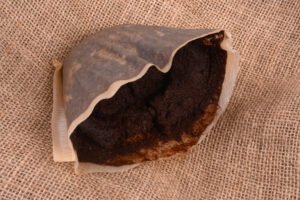After a lovely bonfire party, we’re left with a large amount of wood ash. And you have to throw this ash away, right? But did you know you can reuse it instead? Yes, wood ash makes a good soil amendment. But is wood ash compostable? If yes, how?
Key Takeaways
- You can compost wood ash as long as it is from untreated wood. It is a healthy brown compost material that raises soil pH and contains vital nutrients.
- Organic wood ash can be composted at home through hot and cold composting methods.
- Ensure that ash doesn’t make up more than 5% of the compost.
- Compost made from wood ash increases the soil pH and improves the soil composition by adding plenty of nutrients.
What is Wood Ash?

Wood ash is the powdery substance obtained from burning wood. Ash is the gray-colored tiny powder, and charcoal is the black remnant. They are burnt incompletely, and together they constitute wood ash.
How to Compost Ashes?
Composting ashes is not a difficult task. But you should do it carefully. It can be said that ashes are good brown material for the compost, but you should add them in a regulated manner.
You can compost ashes through Hot Composting and Cold Composting.
Composting Ashes through Hot Composting

Wood ash can be decomposed via hot composting in a pile or a hot compost bin. Here’s how to compost wood ash step by step.
Step 1: Crush the Greens and Browns
First, gather all the brown and green composting materials and chop them into small pieces. Decomposition is accelerated when the size is reduced.
Step 2: Add Brown Material to the Compost Pile
Add a layer of carbon-heavy browns to the bin or open compost pile. Brown elements, such as dead leaves, twigs, mulch, pine needles, newspaper, and so on, add bulk and structure to the compost.
Step 3: Add Green Material
Add Nitrogen-containing material like grass clippings, green leaves, tea bags, hair, kitchen scraps including fruit peels, used eggshells or shrimp shells, bread, coffee grounds, etc.
Green Materials are responsible for the heating up of the pile.
Step 4: Add Wood Ashes
Sprinkle a small amount of wood ash in the compost pile.
Sprinkle ashes to the amount that it makes only 5% of the compost.
Step 5: Add Water
Sprinkle some water to maintain the moisture level of the compost. Do not make the compost pile soggy.
Step 6: Repeat the Green and Brown Layers
Continue layering alternately with greens and browns, along with the addition of ashes. Keep on adding ashes till the pile is active.
Step 7: Turn the Pile After 2 Weeks
Give your compost pile turnings every two weeks to facilitate aeration. Also, maintain the water content in the compost pile.
Your compost will be ready in about 5-6 weeks by hot composting. This method is a relatively faster process but requires a bit of maintenance.
For a less-maintenance method, go for cold composting.
Composting Ashes through Cold Composting

Cold composting usually takes longer and requires patience, but the good thing is that you won’t have to observe your compost pile now and then.
Follow the given steps to compost ash through cold composting.
Step 1: Add a Layer of Brown Material
Add the crushed brown material to the compost pile. You can even add cardboard, paper towels, parchment paper, etc., in this method.
Step 2: Add a Layer of Green Material
Add a layer of Nitrogen-heavy green organic material and kitchen scraps.
Step 3: Add Ashes
Add the ashes to the compost pile in a small amount.
Compost wood ashes in fall or late summer to prepare the final compost before the growing season.
Step 4: Add Water
The addition of water is a must to increase the moisture level.
And that’s it! All you need is a little patience, and your compost will be ready in about six months to a year with all the benefits of ashes.
Benefits of Composting Ashes

If you’re still skeptical about composting wood ash, you must know its many essential benefits.
- Eco-Friendly Way of Disposing Ash: Composting ashes is an environment-friendly way of disposing of the ashes that otherwise would’ve ended up in landfills.
- Improves Composition: Wood ashes are a good source of Potassium, Calcium, Phosphorus, and Magnesium. They also contain Iron, Manganese, Boron, Copper, Zinc, Molybdenum, and Sulfur. All of these improve the soil quality.
- Soil Amendment: Ash compost is an excellent alternative to lime that is added to correct soil acidity.
- Repels pests: Applying compost containing ashes to the soil will deter pests from attacking like snails, slugs, etc.
- Increase Nutrient Holding Capacity: Composting ashes improves the soil’s nutrient-holding capacity by increasing the particles’ surface area.
- Raises pH: Adding ashes to compost will increase the alkalinity of the soil.
Areas with heavy rainfall tend to have more acidic soil. So, using ash compost in the acid soil will benefit the maximum by making it alkaline. It is a superb substitute for lime.
Beneficial Tips for Composting Ashes

These tips will help you compost ashes efficiently and easily to help your plants thrive.
- Don’t Mix Ashes with Nitrogenous Fertilizers: You should not use wood ash with Nitrogen fertilizer like ammonium sulfate, ammonium nitrate, and urea with ashes. Adding these two together will lead to the production of ammonia gas.
- Perform Soil pH Test: It is recommended to test your soil’s pH before adding composted ashes to them. This will help avoid excessive alkalinity in the soil.
- Don’t Burn Wood Especially: Don’t burn wood for the sole purpose of having ashes. This will harm the environment more than doing good to your compost.
- Add Small Doses of Ash: Avoid adding heaps of ash to the pile. Instead, sprinkle them and add them between the layers of green organic matter and brown organic matter.
- Let the Ash Cool Down: Allow the wood ashes to cool down before adding them to compost, as hot ash can pose the risk of fire to the beneficial microbiota in the soil.
Precautions While Composting Ashes
If you want to obtain a high-quality wood ash compost, take the following important measures while composting ash:
- Don’t use ash from barbeque grills, plywoods, painted woods, pressure-heated woods, or charcoal ashes.
- Avoid composting wood ash if the weather is windy.
- Avoid using ash from a black walnut tree.
- Don’t add the ash compost to acidic soils or acid-loving plants like blueberries, Azaleas, or newly planted seeds and seedlings.
- Avoid using excessive amounts of composted wood ash as it will turn the soil alkaline and increase the quantity of heavy metals in the soil. This will also inhibit plant growth.
- Wear Personal Protective Equipment (PPE) like gloves, mask, etc., to avoid skin irritation and inhaling ashes.
Can I use ash from paper in compost?
Yes, you can compost ash from paper, ash from straws, and ash from untreated wood in compost.
Can I compost ash from cigarettes or cigars?
No, it is not recommended to compost ashes from cigarettes or cigars.
Can I use composted ash for the vegetable garden?
Yes, you can use ash in compost for the vegetable garden. However, it is recommended not to apply ash to edible plants.
How can I apply ash to my garden except by composting?
Other ways to apply ash to the garden except composting are top dressing and incorporation into the root zone.
What is the best time to add wood ash to the garden?
The best time to add wood ash to the garden is autumn.
Can we add lump charcoal to compost?
No, you shouldn’t add lump charcoal, charcoal briquette, or ash from the charcoal grill to the compost.
Therefore, you can now save those fireplace ash and add them to your garden soil through compost. It is an excellent way of recycling wood ash. Do not use bbq ash, coal ash, charcoal ash, or ash from treated or stained wood; you’re good to go!
Mulch is another organic material that can be used to make healthy compost. But people are skeptical about using dyed mulch. If you are unsure, too, hop to our guide on composting dyed mulch to learn more!








